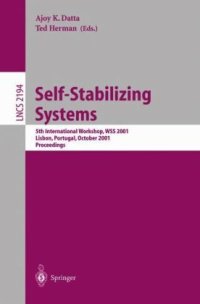
Ebook: Self-Stabilizing Systems: 5th International Workshop, WSS 2001 Lisbon, Portugal, October 1–2, 2001 Proceedings
- Genre: Education // International Conferences and Symposiums
- Tags: Computer Communication Networks, Special Purpose and Application-Based Systems, Computation by Abstract Devices, Algorithm Analysis and Problem Complexity, Management of Computing and Information Systems
- Series: Lecture Notes in Computer Science 2194
- Year: 2001
- Publisher: Springer-Verlag Berlin Heidelberg
- Edition: 1
- Language: English
- pdf
Physicalsystemswhichrightthemselvesafterbeingdisturbedevokeourcuriosity becausewe wantto understand howsuchsystemsareableto reactto unexpected stimuli. Themechanismsareallthe morefascinatingwhensystemsarecomposed of small, simple units, and the ability of the system to self-stabilize emerges out of its components. Faithful computer simulations of such physical systems exhibit the self-stabilizing property, but in the realm of computing, particularly for distributed systems, wehavegreaterambition. We imaginethat all manner of software, ranging from basic communication protocols to high-level applications, could enjoy self-corrective properties. Self-stabilizing software o?ers a unique, non-traditional approach to the c- cial problem of transient fault tolerance. Many successful instances of modern fault-tolerant networks are based on principles of self-stabilization. Surprisingly, the most widely accepted technical de?nition of a self-stabilizing system does not refer to faults: it is the property that the system can be started in any i- tial state, possibly an “illegal state,” and yet the system guarantees to behave properly in ?nite time. This, and similar de?nitions, break many traditional approaches to program design, in which the programmer by habit makes - sumptions about initial conditions. The composition of self-stabilizing systems, initially seen as a daunting challenge, has been transformed into a mana- able task, thanks to an accumulation of discoveries by many investigators. - search on various topics in self-stabilization continues to supply new methods for constructing self-stabilizing systems, determines limits and applicability of the paradigm of self-stabilization, and connects self-stabilization to related areas of fault tolerance and distributed computing.
This book constitutes the refereed proceedings of the 5th International Workshop on Self-Stabilizing Systems, WSS 2001, held in Lisbon, Portugal, in October 2001. The 14 revised full papers presented together with one invited paper were carefully reviewed and selected from 27 submissions. Self-stabilizing software offers a unique, non-traditional approach to the problem of transient fault tolerance. The papers presented explore self-stabilization issues for various different manners of systems and software including communication protocols, cooperating mobile agents, routing in directed networks, crash-affected systems, security, and various other distributed systems and applications.